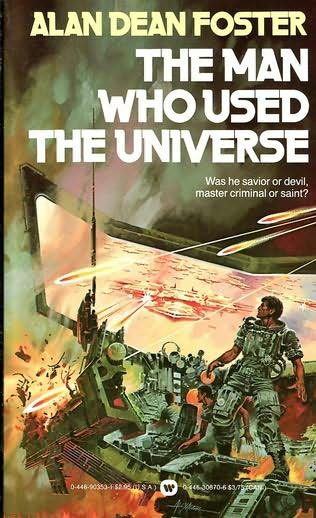The man Who Used the Universe by Alan Dean Foster
(Doubleday, 1983)
Reviewed by Robert W. Bly, founder, ScienceFictionPrediction.com

On the planet Evenwaith, heavy industry has poisoned the air, so people live in cities enclosed in long tubes made of glass and steel. The pollution has decimated flora and fauna, but enclosed in the tubes, humans are unharmed. The author does not explain whether the cities manufacture breathable air or filter the polluted atmosphere from outside.
Other than the environmental problem, The Man Who Used the Universe is a terribly conventional, straightforward 1980s science fiction novel: it features a protagonist, Kees van Loo-Macklin, with superior intelligence and physical strength who overcomes great odds to solve his problems, including Evenwaith's pollution.
Kees' motivation is not humanitarian or benevolent, however. Driven by his mother abandoning him to the state at a young age, Kees seeks power and wealth, and is ruthless in his pursuit of it, killing without regret or emotion anyone who gets in his way.
He rises to become the boss of the planet's biggest crime syndicate and eventually a wealthy owner of legitimate businesses. He forms an alliance with an alien race, the Nuel, and spreads his business empire throughout that planet.
The Nuel and Earth have a sort of cold war, with occasional minor battles and a relationship that is a mixture of guarded cooperation with underlying mutual distrust. The Nuel are considered the ugliest intelligent species in the universe, which causes most humans, but not Kees, to shun them.
Kees, while exploring space for natural resources, encounters a new alien race, the Tremovan. The Nuel are worried: will Kees ally humans and Tremovan against the Nuel?
As the novel moves toward its climax, Kees obviously has some master plan which may or may not be good for the Nuel. Chaheel Riens, a Nuel who has some contact with Kees, suspects Kees may be up to something no good, and conducts his own covert investigation to get to the truth.
As with the Arthur C. Clarke novel Earthlight reviewed on this site, The Man Who Used the Universe is mildly entertaining but hardly riveting. Despite his being abandoned by his mother, Kees never develops fully into a character you can care about, perhaps because he is both superior and ruthless.
Other characters are equally two dimensional, so The Man Who Used the Universe lacks people the reader can care about. It also lacks a big idea – sociological or scientific -- that is truly compelling.
As with Earthlight, had I not been reading The Man Who Used the Universe for this site, I could have easily set it aside. It was pleasant reading, and mildly entertaining, but hardly riveting. This is one you can skip.